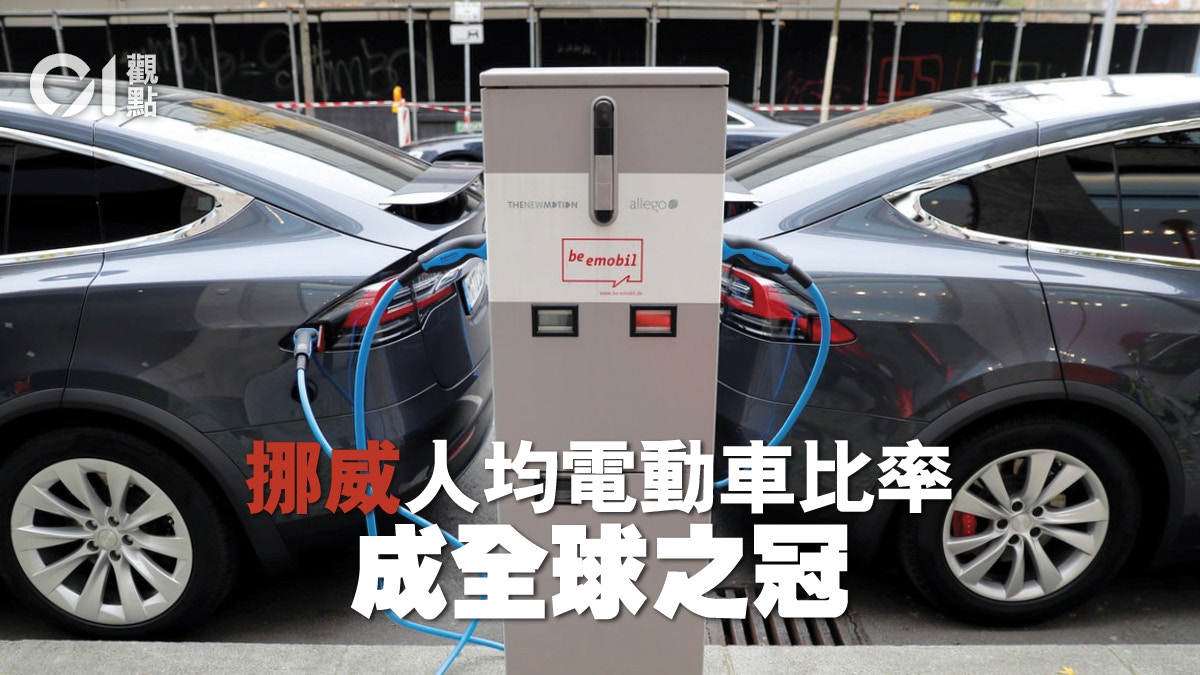01 view
Written by: Commentary Editing Room
2021-01-20 07:00
Last update date: 2021-01-20 07:00
The Nordic country Norway recently announced that its sales of electric vehicles surpassed traditional cars for the first time last year, and the per capita share of electric vehicles is the highest in the world. It is expected to realize the goal of banning the sale of all gasoline vehicles by 2025.
Norway can win the reputation of being the world's electric vehicle capital, not only because its people pay more attention to environmental issues, but also government policy support and supporting facilities.
On the other hand, Hong Kong’s relevant policies lack both macro objectives and economic incentives to attract citizens to switch to electricity. It is worth taking Norway for reference.
As a major oil producer in the world, Norway not only does not have the political resources that it has handicrafted, but ignores the importance of environmental conservation. On the contrary, it is more interested in becoming the first country in the world to ban the sales of non-electric vehicles by 2025. Its goal is farther than Britain has to make progress in 2040.
According to statistics from the Norwegian Road Traffic Information Commission (OFV), the country’s electric vehicle sales last year surpassed the total number of gasoline, diesel and hybrid vehicles for the first time, accounting for 54.3% of new vehicle sales.
OFV Chief Executive Øyvind Thorsen asserted that Norway is "absolutely expected to achieve its 2025 goal."
New packages and tax incentives
Leading the global pace requires an ambitious policy vision beforehand.
As early as 2008, when the capital Oslo formulated its carbon dioxide emission reduction plan, the authorities had regarded the promotion of electric vehicles as the main policy axis, and increased efforts to build charging stations to encourage people to switch to electric vehicles one after another, so as to have 400 electric vehicles in 2011. The car can walk on the road.
Now, in addition to being the country with the highest per capita share of electric vehicles in the world, Norway’s development speed has also won the 2019 European Green Capital Award.
Excluding policy goals, the supporting measures and tax incentives that Norway used to promote the popularization of electric vehicles in the past are also innovative.
As for supporting facilities, the authorities have not only allowed electric vehicle drivers to use the bus lanes since 2005, but also allowed electric vehicles to park for free in municipal parking lots, set private parking fees, and reduced or directly exempted highways and car ferries from cross-sea tolls.
Tax incentives to encourage citizens to switch to electric vehicles are also appropriate, including exemption of value-added tax, import tax, vehicle registration tax, road use tax, etc., or even tax relief for the purchase of electric vehicles in the name of a company.
People will naturally switch to electric vehicles due to many policy incentives.
In contrast, although the Hong Kong government has encouraged citizens to use more electric vehicles in recent years, the relevant supporting facilities are still seriously lagging behind.
The Office of The Ombudsman issued an investigation report in 2019, criticizing the government for failing to clearly explain the electric vehicle policy to the public, and revealing seven major shortcomings in related planning and arrangements, including public charging facilities that lag far behind the increase in electric vehicle charging and charging. Poor management of parking spaces, underestimation of the demand for charging facilities, failure to set clear charging charges, etc.
All this reflects the need for the Hong Kong Government to catch up in a hurry.
In addition to lack of specific policy goals to promote the popularization of electric vehicles, Hong Kong lacks strong incentives for tax incentives.
For example, in April 2017, the Hong Kong government abolished the full exemption of the first registration tax for electric private cars on the grounds that "more and more popular electric private car models have appeared on the market." As a result, the price of electric cars has soared and sales have also increased. Greatly reduced.
Even if the government launches the "One-for-One Replacement Program" the next year to attract car owners to trade in for new ones, the economic incentives are still far less than the exemption of first registration tax.
It is true that the Hong Kong Government should reduce the number of private vehicles in Hong Kong as a whole, but it should also promote green transportation.
Vehicle exhaust is the main source of air pollution in Hong Kong. The government's promotion of electric vehicles lags behind Europe a lot. This goes against the general trend. It is worth studying and referring to the experience and effectiveness of foreign countries.
Furthermore, electric vehicles are undoubtedly a major driving force for the future economic industry. Just like the rise of smart phones more than ten years ago, China has also made the popularization of electric vehicles a policy goal.
The Hong Kong government should find Hong Kong's role as soon as possible, seize the opportunity, and stop being left behind in the wave of economic transformation due to inaction.
Electric vehicles replace traditional fuel vehicles in popularization. Who will be the final winner in the global Sino-US wrestling?
Was rated "very dissatisfied". Electric buses are not operating in Hong Kong?
[Budget] Electric vehicles and ferry policies are a commitment to environmental protection
01 view
Electric cars Norway 01 views





